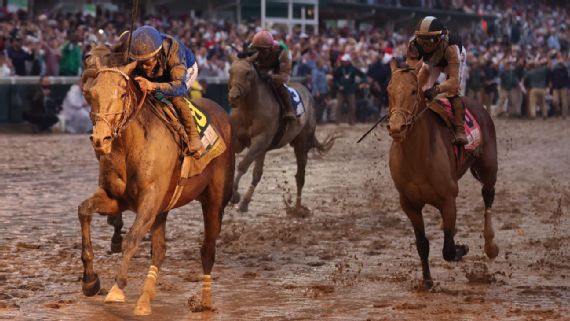This past Saturday was the running of the 151st Kentucky Derby. I’m not much of a horse-racing affecianado. In fact, the only reason I know the race took place this weekend is because I saw it blip through my sports newsfeed. What caught my eye was the condition of the dirt track. It looked more like a tug-of-war mud pit than a racing surface. The official designation for the track’s condition was “sloppy,” which I just learned is a technical term in horse racing, indicating that the ground was saturated with pools of standing water visible. My visceral reaction as I watched the replay of the race was, “Yuck! What a mess!” But, as I understand it, the Derby is run rain or shine, and has never been canceled because of weather conditions.
More remarkable than 19 horses thundering through the slop is that there were nearly 150,000 people in the stands watching it happen. It’s understandable that people who truly haven’t the slightest interest in horse racing would be drawn to the pomp and circumstance associated with the party that is Derby Day at Churchill Downs: women in their elegant dresses and exotic hats, gentlemen in their tails, all of them strutting about as if they belonged to the upper eschelons of aristocracy and sipping on their mint julips. Even if it’s all make-believe, why should the freedom to have fun playing dress-up be restricted to children?
So I get it — on a day when it’s 73 degrees and sunshiny, with a gentle breeze out of the northeast. But in a thunderstorm? You’ve got to be kidding me. Even those who are made of money have to be repulsed at the idea of spending upwards of $600 on a dress and as much or more on a fascinator only to try to protect them by draping a cheap plastic rain poncho over them (or even an expensive one, for that matter). Everyone knows they’re still going to get soaked. And the shoes! What do you do about the shoes? You know you’re not spending $1200 on the rest of the outfil only to show up in a pair of rubber galoshes. Even on a good day, I doubt any woman is wearing her 4″ Louboutins to a place where there is an abundance of concrete, dirt, grass, and horse dung — but in a storm? Let’s face it: on a day like yesterday in Louisville, KY, if your footwear wasn’t made of rubber, it was probably ruined.
Nevertheless, yesterday, in the middle of a downpour, 147,406 people made a choice that I and every other sane person on the planet would not have made. And it begs only one question: why?
The answer is almost as astounding as the question: hope.
I’m not just talking about those who wagered money on the outcome. I have never bet on horses, and I had no other rooting interest in this particular race. Like I said — I wasn’t even aware it had happened until I went looking for information about a game from the NHL’s Stanley Cup playoffs. But as I watched the replay of the Derby, even as a casual, disinterested observer, I felt my heart rate go up a couple of notches. Go ahead — watch it yourself and you’ll see what I mean. As you listen to the crowd noise behind the announcer’s voice, pay attention to your pulse. I’m not saying you’re going to feel something dramatic, but it will go up. You don’t have to want a particular outcome; you just have to experience waiting for it to happen.
The Kentucky Derby is often called “the most exciting two minutes in sports.” That’s debateable, but that’s an argument I’ll leave for the experts on the call-in sports-talk radio shows. What isn’t debateable is that what makes it exciting is the anticipation of the outcome. Two minutes is short enough to keep our attention but long enough for us to process and react to what it happening, and a lot can happen in 1¼ miles. In the case of this year’s Kentucky Derby, the winning horse, Sovreignty, started in 18th position, had to absorb a lot of “kickback” — the genteel racing term for having mud constantly slung in your face by the horses in front of you — but came thundering down the stretch late to win by 1½ lengths.
The curious thing is that knowing what the outcome will be doesn’t really detract from the excitement of the race. Yes, there’s something special about experiencing it “live” for the first time when you don’t know what’s going to happen, but if that sensation was limited to first-time viewers only, YouTube wouldn’t be flooded with videos getting replayed over and over again, Disney would be bankrupt, and the Hallmark Channel wouldn’t exist. The truth is, in many cases, knowing how something ends actually increases and enhances the pleasure of experiencing it again. As a matter of fact, I felt cheated when this year’s announcer did not use the iconic phase, “. . . and down the stretch they come!” because I expect that to be part of each of my Kentucky Derby experiences, even though I don’t consider myself to be a racing fan.
You probably don’t readily associate watching your favorite Harry Potter movie for the 437th time with hope, but that’s what you’re experiencing, whether you realize it or not. Biblical hope, the only truly dependable kind of hope, is absolute confidence in an unseen reality. In other words, you haven’t seen or experienced it fully yet, but you know how the story ends, and it’s awesome. In fact, it is precisely the unfulfilled anticipation of something you know is true that makes hope what it is, and gives it both its allure and power. Oddly, as soon as your hope materializes, it disappears, but that doesn’t disappoint you. Instead, it drives you to want to experience it again. It’s like waiting in line to ride a rollercoaster and, after 90 seconds of exhiliration, wanting to get in line to do it all over again.
That’s the other thing you probably don’t associate with hope: waiting. If you think about it, however, it’s fairly obvious that you can’t have one without the other. Hope and waiting were so closely tied together for the ancient Jews that each of the six different root words for “hope” in Hebrew can either be directly translated as “wait” or have close variations that mean “wait.” In fact, often the only way to tell which meaning is intended is to look at the context, and in many cases the context doesn’t strongly dictate which one is to be preferred.
Take Isaiah 40:31, for example. I memorized this verse as a kid from the King James Version (KJV):
But they that wait upon the LORD shall renew their strength;
they shall mount up with wings as eagles;
they shall run, and not be weary;
and they shall walk, and not faint.
The translators for the New International Version (NIV), however, rendered it this way:
but those who hope in the LORD will renew their strength.
They will soar on wings like eagles;
they will run and not grow weary,
they will walk and not be faint.
For years I longed fly like an eagle, to know what it was like to run without getting tired. “Waiting on the Lord” always seemed a bit ambiguous to me, but when I learned that meant placing my hope in the Lord, it became a little clearer. Then the Lord really took me to school and deepened my understanding of hope . . . by making me wait.
That’s what my book, The Weight of the Wait, is all about. In it, I talk about my struggles with waiting and how God taught me how to wait, and therefore also hope, better. My excitement for the release of the book has been another reminder to me that hope and eager anticipation are inherently tied to waiting. Just like Sovereignty, I’m covered in mud but I don’t care because the finish line is finally within reach!
So, the next time you are tempted to complain about waiting, remember the 151st Kentucky Derby and that the excitement of hope wouldn’t exist without it.



1 thought on “And Down the Stretch They Come!”
Hey, we watched the derby and it was amazing to see not just the winner but the proposed winner who came in second place because Sovreignty kept ahead of Journalism the whole way. There was also a bit of redemption for the trainer who was suspended for 3 years from the derby because he gave his horse a pill before the race which was not an effort to speed him up but because he was having some pain and he did win the race but lost the credit when they tested his urine and in Kentucky, the law states you can’t give a horse that pill before a race under any circumstances. The jockey who won had mud all over him; so he got it full force as he pushed his way from towards the back of the pack to the front. He was the dirtiest jockey of the race, but he didn’t care; he brought the horse to first place. Guess his hope turned into reality as well!